
China is undergoing rapid and profound changes that will have an enormous effect on the nation’s 1.4 billion people, the global economy, international relations and the future of socialism.
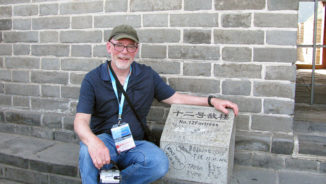
A delegation from the CPUSA of Carol Widom and myself visited China May 26-June 3 at the invitation of the Communist Party of China (CPC) and got a glimpse of these changes. We were invited to attend a forum to celebrate the 200th birthday of Karl Marx with 70 communist, socialist, left and revolutionary parties in Shenzhen, an eco-planned city followed by a week touring Beijing, Hefei, Fengyang County and Xiaogang Village, the site of the first rural economic reforms.
The event reflected the feeling by the CPC that a qualitative turning point has been reached in socialist construction and with China playing a new role on the global stage.
The meeting is an example of China and CPC opening wider to the world and expanding and deepening relations with communist and workers parties.
In December the CPC invited some 200 non-communist political parties, many who are governing, to share results and concepts from 19th CPC Congress last October.
Our week-long visit began with an informational session also attended by delegations from sub-Saharan Africa governments and an official from the United Russia governing party.
The informational session was attended by participants from four simultaneous events covering Africa relations, South America relations, 200th anniversary of Marx’s birth, and the Belt-Road Initiative.
The schedule was geared to familiarize us with developments in China and CPC policies toward ‘building socialism with Chinese characteristics’ in a new era, the economic, governance and party reforms, approach to international relations and role of the CPC itself.
New Era
The world is entering a “new era” of global relations driven by China’s peaceful ascendance and the decline of US and western imperialism. It will affect everything from global economic relations, to global politics and dynamics among communist and workers parties.
The economic and social developments in China in the 40 years since the start of socialist market reforms and opening the country to the global economy under the leadership of Deng Xiaoping are staggering and unprecedented in human history.
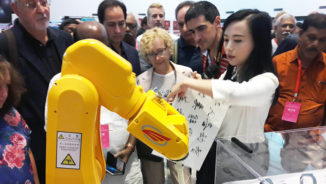
China has leapt from an underdeveloped economy to a largely modern economy and infrastructure almost overnight. Within a decade China will be world’s largest economy as measured by GDP.
A recent Ipsos survey revealed 90 percent of Chinese were satisfied with the country’s path, while only 37 percent of Americans and 11 percent of French said the same.
But the pace of development came at a cost and also brings its own set of problems and challenges. These include subsuming worker rights to overall development, the growth of the capitalist sector with all its risks, contradictions, economic inequalities and the emergence of a billionaire class along with sharpening class struggle, imbalances between urban and rural economies, growing contradiction between increasing needs and ability to address them, not to mention intensifying ideological struggle and the impact on the environment.
Social equality and consciousness tend to trail behind, far behind in some instances.
According to the CPC, China is in the primary stage of socialist construction; it remains a developing country. One could deduce this refers not just to the country’s economics and material level of development, but also to its democratic institutions, civil society and political culture.
Nevertheless, China has achieved a standard of living where everyone can live a “moderately prosperous life”. By 2050 the goal is to achieve fully modern, democratic, sustainable socialism.
The CPC sees the main contradiction as between imbalanced growth and the growing expectations and needs of the people.
Economic growth is nearly 7% per year. China accounts for 30% of global economic growth. China poured more concrete 2011-2013 than U.S. did in entire 20th century.
Seven hundred million people have been brought out of extreme poverty since the reforms began. This accounts for 70% of poverty reduction worldwide. They will eliminate poverty in the next 3-5 years. Most remaining extreme poverty is in rural and remote areas, and many of these communities will be relocated.
The standard of living is also being raised. Wages, while still low by U.S. standards have risen for factory workers by 64 percent since 2011 and are now on par with workers in Portugal and South Africa. Workplace safety has improved.
The scale of mega projects is hard to comprehend: knitting together a mega metropolitan area of 130 million encompassing Beijing and two others cities, water diversion from the south to the north, tunnel projects under the ocean, etc.
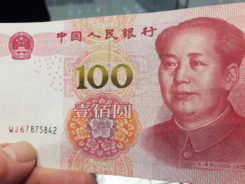
The 19th CPC Congress projected a new round of openness and economic, social and governance reforms that extend decades into the future. As Xi Jinping said, “The door to the world will open wider and wider.”
The CPC projected shifting the economic model from one which is export driven and based on the import of foreign capital and technology to a “made in China by 2025” model. The goal is radically raising productivity, which is approximately one-third the U.S. economy.
This will be achieved by placing a great emphasis on innovation, science, technology, artificial intelligence (AI), big data along with modernization of all aspects of governance, business, finance, services, etc. A world class university system is being developed to attract world class scientific talent.
The economy is roughly 60 percent controlled by publicly owned enterprises and publicly controlled enterprises with minority private investment. The government also directs short and long term strategic social investment.
The state asserts absolute control over armaments, power generation and distribution, oil and petrochemicals, telecommunications, coal, aviation and shipping industries.
Ecological civilization
Since the 18th CPC Congress China has been committed to a sustainable path and building an “ecological civilization” as a national strategy.
This comes in response to the ravages of development which were plain to see and a widespread environmental movement and consciousness that arose among the people. The CPC policy promotes harmony of society and nature and overcoming any contradiction between development and sustainability.
The CPC initiated a “war on pollution” just like the “war on poverty”. It is a shift from quantity to quality in production, prioritizing environmental protection, and becoming a global leader in the fight against the climate crisis.
China is doubling the previous target for solar power production by 2020 and is the largest producer of solar panels in the world. Plans were halted to build 150 coal fired plants, and installation of desulfurization and denitration filters on the remaining plants is nearly complete; China sells more electric vehicles than Europe and US combined and passed laws to create a circular economy (reuse, recycling and remanufacturing).

A 35,000 kilometer high-speed train network is half complete. This is more than the rest of world combined and will allow people to commute longer distances. The second generation of high-speed trains are completely designed and built in China.
The country is constructing 6 mega windfarms and carrying out the largest reforestation project in the world. A few years ago, Beijing was plagued with regular sandstorms originating in Inner Mongolia. The sandstorms have largely been contained by planting a Great Green Wall.
We saw other examples of an eco-civilization taking shape. Cities are full of greenery and on our bus ride to Xiaogang Village the 50-mile highway was lined with a band of trees 75 feet wide on both sides.
However, enormous challenges remain. China still produces more CO2 than any other country and its developmental goals will keep it committed to coal fired plants. In addition, plastic is ubiquitous and the source of the plastic waste stream include four Chinese Rivers among the top ten emptying into the Pacific Ocean. (although as of 2018 China will no longer import plastic waste from US and EU).
International relations
China’s economic reforms are also dependent on “opening wider and wider” to the global economy, ensuring a stable global trade environment and peace.
The peaceful rise of China and decline of US imperialism, the emergence of a multi-polar world, deepening and expanding globalization of production and multilateral trade pacts, and the mass communications and technological revolutions are shaping the emergence of a new global dynamic.
The essence of the opening policy is a recognition that no country can develop its economy in isolation and must engage in the globalized economy dominated for the time being by the U.S. and other imperialist powers. China realizes its state owned companies and private corporations must play by these rules and be competitive in the global market.
China is operating by a concept of international relations referred to as “Building a community for a shared future.” It involves “two guidelines”: build a more just and reasonable new world order and jointly maintain international security.
These are international relations of a new type based on mutual respect regardless of social system, fairness and justice, working out problems peacefully and win-win economic cooperation.
It also involves a new model of relationships between major countries, disputing the prevailing international order, and reforming global governance systems established during post WWII such as the UN Security Council, IMF and World Bank, etc.
It is based on the idea no country can solve problems of development, climate change, peace, poverty, disease, resource allocation, etc. on their own: it takes cooperation.
China will play a bigger role in all international forums, e.g., the Paris Climate Agreement.
China has been building alternative international networks and relationships since the fall of the USSR including the Shanghai Cooperative Organization (SCO), the association of five major emerging economies known as BRICS (Brazil, Russia, India, China and South Africa) and alternative financial institutions to facilitate trade and development including the Asian Infrastructure Investment Bank.
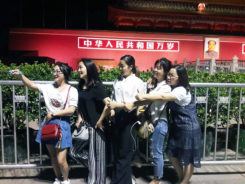
From keeping a low profile to becoming assertive and aspirational, China’s foreign policy will engage and increasingly impact the dominant pattern of capitalist globalization relations.
One mammoth developmental project is the Belt-Road Initiative (BRI) – $1 trillion investment in road, rail, and maritime ports, energy pipelines, power grids, refineries, connecting 65 countries with trade and cultural exchange. Once complete, the BRI could boost global trade by an estimated 12%.
The BRI is geared to facilitating trade and infrastructure development of countries involved while securing raw materials and resources China needs for its own development, theoretically a win-win.
The opening policy is also having an impact on developments on the Korean peninsula, drawing North Korea into the global economic and governance system.
U.S. ruling circles are divided on foreign policy and trade. Trump’s economic protectionism and nationalism is threatening to disrupt the global trading system. China is concerned whether economic nationalism characterizes only the Trump administration or is a fundamental shift by U.S. ruling circles.
The rise of protectionism effects China’s drive for openness and reform. These policies depend on deeper connection to the global trading system and creating a more fair and well balanced system.
Trump has targeted China and Russia as strategic rivals. Tariffs and other demands are meant to blunt China’s rise by gutting state investment and guidance of the economy, support for high tech and basic scientific sector, and demanding that its finance sector open for foreign investment.
Democracy and governance reform
The CPC is projecting a reform of governance to fit the new era. Emphasis is being placed on establishing a rule of law society, which along with economic reforms, comprise “two wings of bird.”
A rule of law society means enforcing the constitution, developing judiciary and legal rights, regulatory bodies, streamlining governmental agencies, environmental and consumer protections, etc. This will take some time to develop and entails cultivating a grassroots democratic culture and vibrant civil society.
Among the biggest problems are the growth of wealth inequality and emergence of a billionaire class which is larger than that in the U.S. One study indicated the National People’s Congress had elected delegates with a net worth of $500 billion. The billionaire class is the source of much of the corruption in the society and party and has been expatriating billions of dollars of wealth and investing overseas.
Although an independent media has emerged since Deng Xiaoping, Reporters without Borders ranks press freedom very low. There is a widespread domestic social media, but Facebook, Twitter, YouTube are banned.
The free flow of information in a world of cyber warfare and the battle of ideas are challenges facing every country. But Chinese citizens are finding ways around the bans which means censorship is largely ineffective and will only garner resentment.
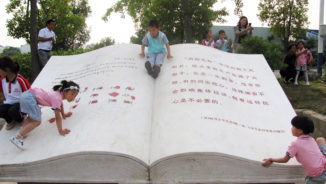
Women are guaranteed equal rights under the constitution but winning that in reality is far more difficult. Over 80% of women are in the workforce but vestiges of patriarchal society remain including sexual harassment, property rights and unwanted daughters.
The presence of women in CPC leadership and among elected officials is scarce.
Changes are afoot including with a new anti-sexual harassment law and anecdotally we learned over 50% of a geo-physicist class were women.
Gay and lesbian rights also lag far behind. We were told attitudes toward gays and lesbians are like the U.S. military “Don’t ask, don’t tell” policy. But things are changing among China’s younger generation who are totally accepting of different sexual orientations and identities.
We didn’t learn anything on the status of national minorities. Affirmative action type development projects are seen as a priority as is respect for cultural traditions. From reports some nationalists and religious extremists are taking advantage of the situation to foment separatist movements. But breaking up China’s territory won’t be tolerated.
The CPC freely admits there are imperfections in democracy. Take into consideration 2000 years of imperial rule ended in 1912 with the Xinhai Revolution followed by civil war, Japanese occupation and WWII; the revolutionary war for independence resulted in the founding of the People’s Republic in 1949 only to be followed by the turmoil of the “Great Leap Forward” and “Cultural Revolution.”
China didn’t pass through bourgeois democratic republic phase. During its history, a single party emerged as leader. Authoritarian tendencies carried over from the revolutionary war for independence and establishment of socialist republic.
Creating democratic institutions didn’t really begin until the reforms of 1978. China’s system of elections is hierarchical – each legislative body is drawn from the legislative bodies below. It’s system of participatory and consultssative democracy is unique. National, state and local direct elections are the goal. China is an evolving new democracy.
The CPC
The CPC is a deeply revolutionary party, creatively applying Marxism to the Chinese reality. Their approach is pragmatic, fact based, self-critical, and self-reforming.
Far from building a capitalist economy, the CPC is charting a path in the context of China’s realities, guiding the country to achieve a modern socialist society under extraordinary difficult conditions and not without many problems, mistakes and shortcomings, one with “Chinese characteristics.”
The CPC is forging a path through uncharted territory.
The CPC is leading a country of 1.4 billion people through mind boggling changes. Their experience has a lot of relevance for developing countries and it gives confidence that it is possible to eliminate poverty and adopt a sustainable path of development in a relatively short span of time.
Enormous changes are taking place almost overnight. The CPC believes it is not possible to navigate these changes without a strong, united Party, politically, theoretically and organizationally.
The 19th CPC Congress called for elevating and strengthening the role of the 86 million member party; to strengthen leadership, functioning, intra-party democracy, connection to people, and theoretical development. As Xi said, “The CPC must change with the times.”
Corruption is one of the main challenges undermining authority of the Party. The CPC has taken steps to eliminate extravagant banquets and restore accountability.
Over 30,000 cadres have been dropped from membership including political bureau and provincial leaders. Overall, one million officials have been punished for corruption since 2013.
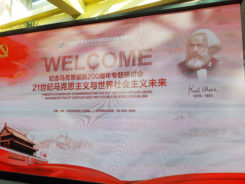
They are applying Marxism to Chinese reality, insisting each party must adopt its own path, and there are no universal models. Even when one comrade from a fraternal party suggested the 21st century would be the century of Eurasia, the ID CPC leader said it would be “the century of the world’s people”.
The CPC wants to elevate dialog and sharing because “each party is captive of its experience.”
The CPC’s opening will have a good effect on communist, socialist and revolutionary parties around the world. They are injecting refreshing, new concepts based on a unique experience. They insist they are not trying to impose their model, there is no new “center”, that equality between parties and countries big or small must be the norm.
But by their mere size and accomplishments they will have huge influence.
The image of Chinese socialism, positive and negative, will have a big impact on how people in the U.S. view socialism. China’s model is not ours and the complexity of development makes it hard to explain to the American people. We can discuss the positive achievements but must find ways to explain China’s unique history, problems, and shortcomings in a partisan way without arrogance on our part.
And most of all we must continue to develop our own vision of a democratic, demilitarized, sustainable socialism and the democratic path we project to get there.


 Join Now
Join Now